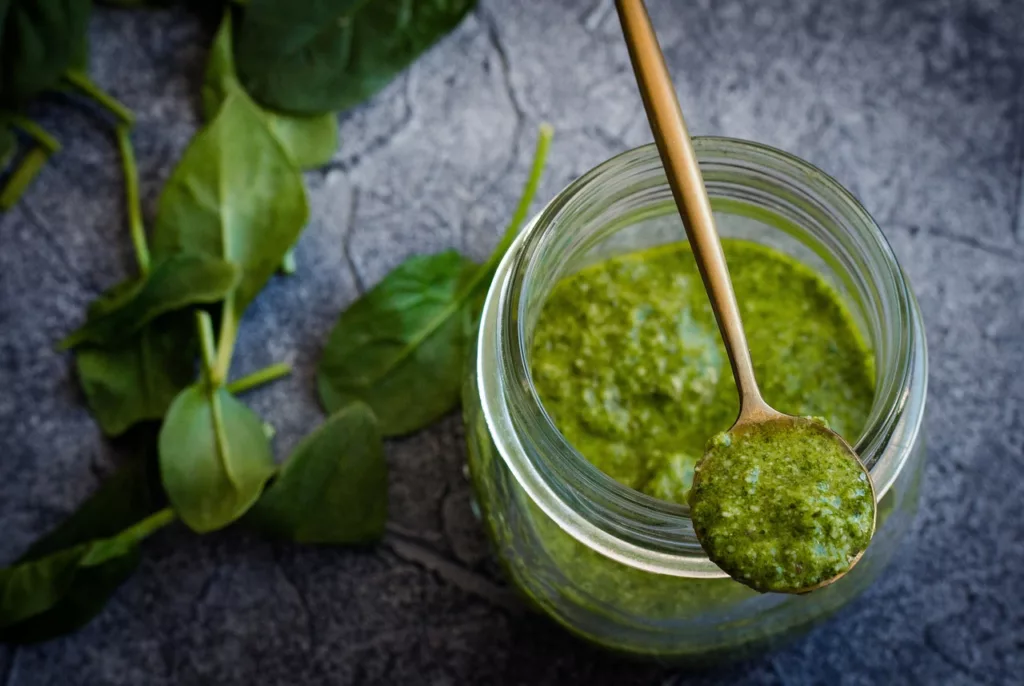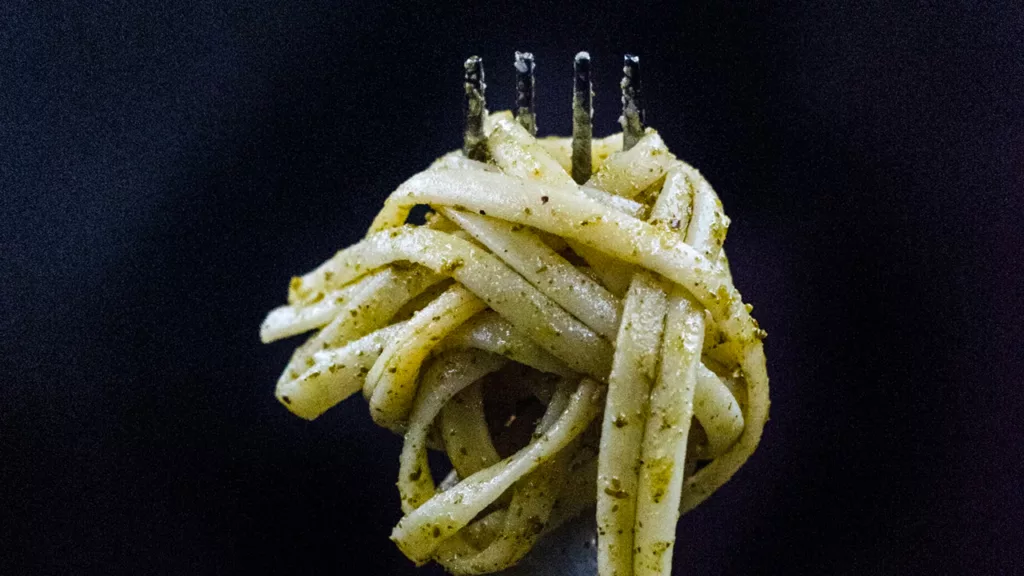Is Pesto Vegan? Pesto is a popular Italian sauce that is traditionally made with fresh basil, pine nuts, Parmesan cheese, garlic, olive oil, and salt. However, with the rise of veganism and the increasing demand for plant-based alternatives, many people wonder if pesto can be made vegan-friendly. In this article, we will explore the ingredients of traditional pesto, discuss whether it is vegan or not, provide vegan alternatives for pesto, share a homemade vegan pesto recipe, highlight store-bought options, discuss the benefits of vegan pesto, and address common misconceptions surrounding this versatile sauce.
Ingredients of Traditional Pesto
Traditional pesto typically consists of several key ingredients that contribute to its distinct flavor and texture. These ingredients include fresh basil, pine nuts, Parmesan cheese, garlic, olive oil, and salt. While the combination of these ingredients creates a delicious and aromatic sauce, it is important to examine their individual components to determine if pesto can be considered vegan.
Is Traditional Pesto Vegan?
When it comes to traditional pesto, it is not considered vegan due to the inclusion of Parmesan cheese. Parmesan cheese is made from cow’s milk, making it an animal product and therefore not suitable for those following a vegan lifestyle. Although the other ingredients like basil, pine nuts, garlic, olive oil, and salt are plant-based, the presence of Parmesan cheese renders traditional pesto non-vegan.
Vegan Alternatives for Traditional Pesto
Thankfully, there are numerous vegan alternatives available for those who wish to enjoy the flavors of pesto without the use of animal products. Let’s explore some common substitutes for the non-vegan ingredients found in traditional pesto:
Basil and other herbs
Basil is the primary herb used in pesto, and it provides a fresh and vibrant flavor. However, you can experiment with other herbs such as cilantro, parsley, or even arugula to create unique variations of vegan pesto.
Nutritional yeast as a cheese substitute
To mimic the cheesy taste of Parmesan, nutritional yeast is often used in vegan pesto recipes. Nutritional yeast is a deactivated yeast that adds a savory, umami flavor to dishes and can be found in health food stores or online.
Different nuts and seeds
Pine nuts can be replaced with a variety of nuts and seeds, including walnuts, almonds, cashews, or sunflower seeds. Each option offers a slightly different taste profile, allowing you to customize the flavor of your vegan pesto.
Olive oil as the base
Olive oil serves as the base for pesto, and luckily, it is already vegan-friendly. Choose a high-quality extra virgin olive oil to enhance the taste and ensure the best results.
Seasonings and spices
To add depth of flavor to vegan pesto, you can incorporate additional seasonings and spices such as nutritional yeast, lemon juice, black pepper, or even a pinch of red pepper flakes for a spicy kick.
Homemade Vegan Pesto Recipe
Now that we’ve discussed the vegan alternatives, let’s dive into a simple and delicious homemade vegan pesto recipe:
Ingredients:
- 2 cups fresh basil leaves
- 1/2 cup nuts or seeds (e.g., walnuts, cashews, or sunflower seeds)
- 2 tablespoons nutritional yeast
- 2 cloves of garlic
- 1/4 cup extra virgin olive oil
- 1 tablespoon lemon juice
- Salt to taste

Instructions:
- In a food processor or blender, combine the basil, nuts or seeds, nutritional yeast, and garlic.
- Pulse until the ingredients are roughly chopped.
- Gradually add the olive oil and lemon juice while continuing to blend.
- Blend until the mixture reaches your desired consistency.
- Taste and season with salt as needed.
- Transfer the pesto to a jar or container and store in the refrigerator.
Store-bought Vegan Pesto
If you’re short on time or prefer the convenience of pre-made options, there are several store-bought vegan pesto brands available. Look for labels that explicitly state “vegan” or check the ingredient list to ensure there are no animal-derived ingredients.
Benefits of Vegan Pesto
In addition to catering to a vegan lifestyle, opting for vegan pesto can offer several benefits. Firstly, it can be a healthier alternative to traditional pesto, as it typically contains less saturated fat and cholesterol. Secondly, by using plant-based ingredients, vegan pesto contributes to environmental sustainability and reduces the demand for animal products. Lastly, choosing vegan pesto aligns with ethical considerations by promoting a compassionate approach towards animals.
Creative Uses for Vegan Pesto
Vegan pesto is a versatile sauce that can be used in various ways to enhance the flavor of your dishes. Consider the following creative uses for vegan pesto:
- Toss it with pasta for a quick and flavorful meal.
- Spread it on a sandwich or wrap for added zing.
- Drizzle it over roasted vegetables or salads.
- Use it as a marinade for tofu or tempeh before grilling or baking.
Common Misconceptions About Vegan Pesto
Despite its numerous advantages, there are a few common misconceptions about vegan pesto that are worth addressing. Some people assume that vegan pesto will taste significantly different from the traditional version, but with the right combination of ingredients, it can be equally delicious. Additionally, some worry about the nutritional value and protein content of vegan pesto, but by incorporating various nuts, seeds, and nutritional yeast, it can still provide essential nutrients.
Conclusion
In conclusion, while traditional pesto is not vegan due to the inclusion of Parmesan cheese, there are plenty of alternatives available for those who follow a plant-based diet. By substituting ingredients like cheese with nutritional yeast and using different nuts or seeds, you can create delicious vegan pesto at home. Whether you choose to make it from scratch or opt for store-bought options, vegan pesto offers a flavorful and ethical alternative to its non-vegan counterpart.
FAQs Is Pesto Vegan
Vegan pesto tends to be lower in saturated fat and cholesterol, making it a healthier option compared to traditional pesto.
Yes, you can freeze vegan pesto. Store it in an airtight container or ice cube trays for easy portioning.
Homemade vegan pesto can last up to one week in the refrigerator. Be sure to check for any signs of spoilage before consuming.
Absolutely! Vegan pesto can be a versatile addition to various cuisines, including sandwiches, salads, and marinades.
Yes, you can substitute pine nuts with walnuts, cashews, almonds, or sunflower seeds in vegan pesto recipes.




